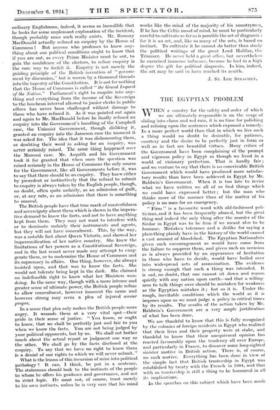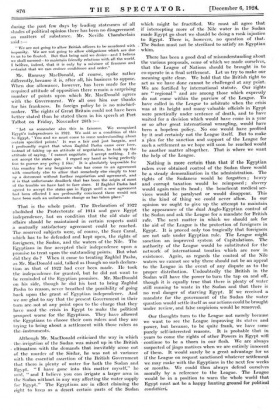THE EGYPTIAN PROBLEM
WHEN a country for the safety and order of which • we are ultimately responsible is on the verge of sliding into chaos and red ruin, it is no time for polishing and refining upon the sentences which expound a remedy. In a more perfect world than that in which we live such a thing would no doubt be desirable, for patience, courtesy and the desire to be perfectly just in form as well as in fact are beautiful virtues. Many critics of the Government have been complaining of the prompt and vigorous policy in Egypt as though we lived in a world of visionary perfection. That is hardly fair ; and we venture to say that there is no conceivable British Government which would have produced more satisfac- tory results than have been achieved in Egypt by Mr.
Baldwin's Government. When it is 'too late to revise what we have written we all of us find things which we could have expressed better ; but the man who thinks more of the manner than of the matter of his policy is no man for an emergency.
" Firm " is a favourite word with old-fashioned poli- ticians, and it has been frequently abused, but the great thing and indeed the only thing after the murder of the Sirdar in Egypt was to be firm if we meant also to be humane. Mistaken tolerance and a dislike for saying a plain thing plainly have in the history of the world caused a vast amount of bloodshed. The Egyptian Nationalists given such encouragement as would have come from the failure to suppress them, and given such an occasion as is always provided by an appearance of hesitation in those who have to decide, would have boiled over into widespread acts of assassination. The evidence is strong enough that such a thing was intended. It is sad, no doubt, that one cannot sit down and reason quietly with any nation upon earth—sad that a willing- ness to talk things over should be mistaken for weakness as the Egyptian mistakes it ; but so it is. Under the rough, inevitable conditions which the world as it is imposes upon us we must judge a policy in critical times by its results. The results of the action taken by Mr. Baldwin's Government are a very ample justification of what has been done.
We are thankful to know that this is fully recognized by the colonies of foreign residents in Egypt who realized that their lives and their property were at stake, and thankful to know that their unequivocal opinion has reacted .favourably upon the tendency all over Europe, and particularly in France, to discover some long-sighted sinister motive in British action. There is, of course, no such motive. Everything has been done in view of the simple fact that British trusteeship in Egypt was established by treaty with the French in 1904, and that with us trusteeship is still a thing to be honoured in all its implications.
In the speeches on this subject which have been made during the past few days by leading statesmen of all shades of political opinion there has been no disagreement on matters of substance. Mr. Neville Chamberlain said .- " We are not going to allow British officers to be murdered with impunity. We are not going to allow obligations which are duo to us to be flouted. But that being said we desire—and I believe we shall succeed—to maintain friendly relations with all the world. I believe, indeed, that it is only by a mixture of firmness and restraint that we can restore confidence and order."
Mr. Ramsay MacDonald, of course, spoke rather differently, because it is, after all, his business to oppose. *hen due allowance, however, has been made for the required attitude of opposition there remain a surprising number of points upon which Mr. MacDonald agrees with the- Government. We all owe him our thanks for his frankness. In foreign policy he is no mischief- maker. The rights of Great Britain could not have been better stated than he stated them in his speech at Port Talbot on Friday, November 28th :--- " Let us remember also this in fairness. Wo recognized Egypt's independence in 1922. We said as a condition of this to Egypt, ' You and we must come to some understanding about curtain specified points.' It was a fair and just bargain, and I profoundly regret that when Zaghlul Pasha came over here, instead of taking up an attitude of negotiation, he took up the attitude of saying, I cannot negotiate. I accept nothing. I do not accept the status quo. I regard my hand as being perfectly free to pursue any policy I It is absolutely impossible for this country for any bargainer who has como to an agreement with somebody else to allow that somebody else simply to tear up a document without further negotiation and ‘agreement, and it is that unfortunate deadlock that has been the origin. of most of tha.trouble we have had to face since. If Zaghlul Pasha had agreed to accept the status quo in Egypt until a new agreement had been effected I am profoundly convinced there would not have been such an unfortunate change as has taken place."
That is the whole point. The Declaration of 1922 abolished the Protectorate of 1914 and gave Egypt independence, but on condition that the old state of affairs should be maintained in certain respects until a mutually satisfactory agreement could be reached. The. reserved subjects were, of course, the Suez Canal, which has to be. defended and kept open, the rights of foreigners, the Sudan, and the waters of the Nile. The Egyptians in fine- accepted their independence upon a promise-to treat upon the outstanding points. But what did they do ? When it came to treating Zaghlul Pasha, as Mr. MacDonald said, talked as though no such declara- tion as that of 1922 had ever been made. He took the independence . for granted, but he did not want to be reminded of the Egyptian promises. Mr. MacDonald on his side, though he did his best to bring Zaghlul Pasha to reason, never breathed the possibility of going back upon the- grant of Egyptian independence. And we arc. glad to say that the present Government in their turn are- not at any point open to the charge that they have used the. crisis in Egypt to make the political prospect worse for the Egyptians. They have allowed the Egyptians to choose their own rulers and they are trying to bring about a settlement with those rulers as the-instruments.
Although Mr. MacDonald criticized- the way in which - the-irrigation of the Sudan was mixed up in the British . ultimatum ,with the demands that inevitably arose out of the murder of the Sirdar, he was not at variance with the essential assertion of the British Government that there- is plenty of water for both the Sudan and Egypt. " I have gone into this matter myself," he said, " and I believe you can irrigate a larger area in the Sudan without. in any way affecting the water supply for Egypt." The Egyptians are in effect claiming the right to keep as a desert certain parts of the Sudan which might be fructified. We must all agree that if intercepting more of the Nile water in the Sudan made Egypt go short we should be doing a rank injustice to Egypt. There is, however, no question of that. _ The Sudan must not be sterilized to satisfy an Egyptian - whim.
There has been a good deal of misunderstanding about the various proposals, some of which we made ourselves, that the League of Nations should be brought- in to co-operate in a final settlement. Let us try to make our meaning quite clear. We hold that the British right to act as we have done cannot be challenged at any point. We are fortified by international statute. Our rights are " regional " and are among those which expressly do not come within the purview of the League. To have called in the League to arbitrate when the crisis was at its height and many valuable officials in' Egypt were practically under sentence of death, and to have waited for a decision which would have come in a year or so after great international wrangling, would have been a hopeless policy. No one would haVe profited by it and certainly not the League itself. But to make a plea for the sanction and support of the League for such a settlement as we hope will soon be reached would be another matter altogether. That is where we want the help of the League.
Nothing is more certain than that if the Egyptian rulers ever obtained control of the Sudan there would be a steady demoralization in the administration. The rights of the Sudanese would be forgotten ; heavy and corrupt taxation would be reimposed ; slavery would again raise its head ; the beneficent medical ser- vices would be paralysed or would disappear. This is the kind of thing we could never allow. In our opinion we ought to give up the attempt to maintain the appearance of the dual Anglo-Egyptian control of the Sudan and ask the League for a mandate for British rule. The next matter in which we should ask for the aid of the League is the protection of foreigners in Egypt. It is proved only too tragically that foreigners are not safe under Egyptian rule. The League might sanction an improved system of Capitulations. The authority of the League would be substituted for the network of international treaties which are now in existence. Again, as regards the control of the Nile waters we cannot see why there should not be an appeal to the League in the event of any dispute as to the proper distribution. Undoubtedly the British in the Sudan will have the power to turn the tap on and off, though it is equally true that there is plenty of water still running to waste in the Sudan and that there is no real danger of starving Egypt. If we received a mandate for the government of the Sudan the water question would settle itself as our actions could be brought under review, and false suspicions would be removed.
Our thoughts turn to the League not merely because we want to see the League improving its status and power, but because, to be quite frank, we have some purely self-interested reasons. It is probable that in years to come the rights of other Powers in Egypt will continue to be a thorn in our flesh. We are always suspected of jingo motives when we are entirely innocent of them. It would surely be a great advantage for us if the League on request sanctioned whatever settlement we may make with the Egyptians in the next few weeks or months. We could then always defend ourselves morally by a reference to the League. The League would be in a position to warn the whole world that Egypt must. pelt be a happy hunting ground for political condottieri.



















































 Previous page
Previous page